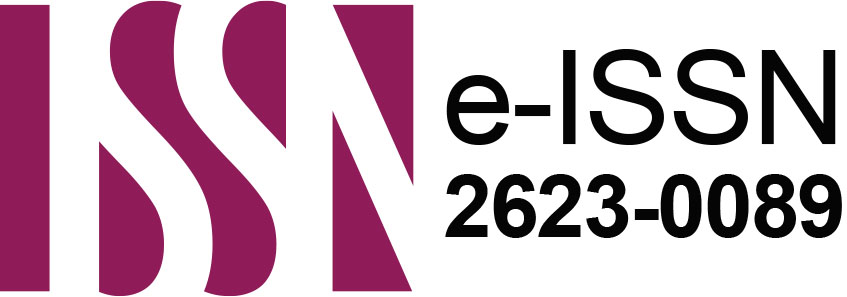Stock Investment Behavior of the Millennial Generation: The Moderating Role of Financial Literacy
Abstract
The purpose of this research is to analyze the investment behavior of the millennial generation in Indonesia. The independent variables in this research are gender, income, and social environment. The dependent variable is investment behavior, while financial literacy is the moderating variable. The sample of this research was determined based on the purposive sampling method. There were 144 respondents selected from the millennial generation who were in the age range of 21-41 years old and had invested in stocks. The data collection was carried out online by distributing questionnaires through Google Forms in a WhatsApp group and a stock investment community Telegram group. The analysis technique used was a Moderated Regression Analysis (MRA). This research found that income and gender have no effect on the millennial generation’s stock investment behavior. Financial literacy is not confirmed to moderate the effect of income on investment behavior and the effect of gender on investment behavior. However, the social environment has a significant positive effect on investment behavior, and there is evidence that financial literacy moderates the influence of the social environment on the stock investment behavior of the millennial generation.
Keywords
Full Text:
PDFReferences
Agrawal, S. S., & Kumar, A. (2020). A study of determining factors shaping investing behavior of investors towards mutual funds. Paper presented at the UNNAYAN. Conference Special Issue.
Albert, S. M., & Duffy, J. (2012). Differences in risk aversion between young and older adults. Neuroscience neuroeconomics, 2012(1).
Ali, H., Purwandi, L., Nugroho, H., Ekoputri, A., & Halim, T. (2017). The urban middle-class millenials Indonesia: Financial and online behavior: Jakarta: PT. Alvara.
Aminatuzzahra, A. (2014). Perception effect of financial knowledge, financial attitudes, social demography against financial behavior in individual investment decision making. Journal of Business Strategy, 23(2).
Anastasia, N., Setiadiwiria, O. C., & Kunto, Y. S. (2019). Difference between financial intelligence on millennials, gen x, and baby boomers. BISMA, 12(1), 15-28.
Annajah, U., & Falah, N. (2016). Pengaruh Lingkungan Sosial terhadap Motivasi Berprestasi Anak Panti Asuhan Nurul Haq Yogyakarta. Hisbah: Jurnal Bimbingan Konseling dan Dakwah Islam, 13(2), 102-115.
Antara. (2022, 25 Januari 2022). Jumlah Investor Milenial Naik saat Pandemi Covid-19, Didorong Influencer. Tempo.
Aren, S., & Zengin, A. N. (2016). Influence of financial literacy and risk perception on choice of investment. Procedia-Social Behavioral Sciences, 235, 656-663.
Artaman, D. M. A., Yuliarmi, N. N., & Djayastra, I. K. (2015). Analisis Faktor-Faktor Yang Mempengaruhi Pendapatan Pedagang Pasar Seni Sukawati Gianyar. E-Jurnal Ekonomi dan Bisnis Universitas Udayana, 4(02), 87-105.
Ateş, S., Coşkun, A., Şahin, M. A., & Demircan, M. L. (2016). Impact of Financial Literacy on the Behavioral Biases of Individual Stock Investors: Evidence from Borsa Istanbul. Business Economics Research Journal, 7(3).
Awais, M., Laber, M. F., Rasheed, N., & Khursheed, A. (2016). Impact of financial literacy and investment experience on risk tolerance and investment decisions: Empirical evidence from Pakistan. International Journal of Economics Financial Issues, 6(1).
Baker, H. K., Kumar, S., Goyal, N., & Gaur, V. (2019). How financial literacy and demographic variables relate to behavioral biases. Managerial Finance, 45(1), 124-146. doi:10.1108/MF-01-2018-0003
Booth, A., Cardona-Sosa, L., & Nolen, P. (2014). Gender differences in risk aversion: do single-sex environments affect their development? Journal of economic behavior organization, 99, 126-154.
Budiarto, A. (2017). Pengaruh financial literacy, overconfidence, regret aversion bias, danrisk tolerance terhadap keputusan investasi (studi pada investor PT. Sucorinvest central gani galeri investasi BEI universitas negeri surabaya). Jurnal Ilmu Manajemen, 5(2).
Cahyadi, S. M. (2010). Pengaruh Faktor Demografi Terhadap Perilaku Investor dan Jenis Investasi. (Skripsi Sarjana), STIE Perbanas Surabaya.
Catriana, E. (2020, 22 Desember 2020). Selama Pandemi, Minat Milenial untuk Berinvestasi Naik 2 Kali Lipat. Kompas.
Charles, M. A., & Kasilingam, D. R. (2013). Does the investor's age influence their investment behaviour? Paradigm, 17(1-2), 11-24.
Cudmore, B. A., Patton, J., Ng, K., & McClure, C. (2010). The millennials and money management. Journal of Management Marketing Research, 4, 1.
Deb, M., & Chavali, K. (2009). A Study of Gender Differences in Investment Behaviour. Asia Pacific Business Review, 5(3), 45-55.
Guzavicius, A., Vilkė, R., & Barkauskas, V. (2014). Behavioural finance: Corporate social responsibility approach. Procedia-Social Behavioral Sciences, 156, 518-523.
Halim, V. (2020, Selasa 28 Januari 2020). Jokowi Bandingkan Inklusi Keuangan RI dengan Singapura hingga Thailand. OkeFinance.
Hanson-Rasmussen, N. J., & Lauver, K. J. (2018). Environmental responsibility: millennial values and cultural dimensions. Journal of global responsibility, 9(1), 6-20. doi:10.1108/JGR-06-2017-0039
Haroon, O., & Rizvi, S. A. R. (2020). COVID-19: Media coverage and financial markets behavior—A sectoral inquiry. Journal of Behavioral Experimental Finance, 27, 1-6. doi:10.1016/j.jbef.2020.100343
Hati, S. W., & Harefa, W. S. (2019). Analisis Faktor-Faktor yang Mempengaruhi Minat Berinvestasi di Pasar Modal Bagi Generasi Milenial. Journal of Applied Business Administration, 3(2), 281-295.
Hibbert, A. M., Lawrence, E. R., & Prakash, A. J. (2013). Does knowledge of finance mitigate the gender difference in financial risk-aversion? Global finance journal, 24(2), 140-152.
Hsu, Y.-L., Chen, H.-L., Huang, P.-K., & Lin, W.-Y. (2021). Does financial literacy mitigate gender differences in investment behavioral bias? Finance Research Letters, 41, 101789.
Jonubi, A., & Abad, S. (2013). The impact of financial literacy on individual saving: An exploratory study in the Malaysian context. Transformations in Business economics & Management, 12(1), 28.
Lai, M. M., & Tan, W. K. (2009). An empirical analysis of personal financial planning in an emerging economy. European Journal of Economics, Finance and Administrative Sciences, 16(16), 102–115.
Lusardi, A., & Mitchell, O. S. (2014). The economic importance of financial literacy: Theory and evidence. Journal of economic literature, 52(1), 5-44.
Lusardi, A., Mitchell, O. S., & Curto, V. (2010). Financial literacy among the young. Journal of Consumer Affairs, 44(2), 358-380.
Margaretha, F., & Pambudhi, R. A. (2015). Tingkat literasi keuangan pada mahasiswa S-1 fakultas ekonomi. Jurnal Manajemen dan Kewirausahaan, 17(1), 76-85.
Masrurun, I., & Yanto, H. (2015). Determinan perilaku investor individu dalam pengambilan keputusan investasi saham. Accounting Analysis Journal, 4(4).
Nugraheni, H., Wiyatini, T., & Wiradona, I. (2018). Kesehatan Masyarakat dalam Determinan Sosial Budaya: Deepublish.
Nurhanisah, Y. (2020). Yuk, Kenalan dengan Millenial Indonesia!
Nurhidayah, N. (2018). Gender, Pengetahuan Keuangan, dan Niat Bertansaksi Saham. Jurnal Ilmiah Bisnis Dan Ekonomi Asia, 12(2), 7-15.
Onasie, V., & Widoatmodjo, S. (2020). Niat Investasi Generasi Milenial Di Pasar Modal. Jurnal Manajerial dan Kewirausahaan, 2(2), 318-326.
Pak, O., & Mahmood, M. (2015). Impact of personality on risk tolerance and investment decisions: A study on potential investors of Kazakhstan. International Journal of Commerce Management & Production Engineering Review, 25(4), 370-384. doi:10.1108/IJCoMA-01-2013-0002
Pradikasari, E., & Isbanah, Y. (2018). Pengaruh financial literacy, illusion of control, overconfidence, risk tolerance, dan risk perception terhadap keputusan investasi pada mahasiswa di Kota Surabaya. Jurnal Ilmu Manajemen, 6(4).
Putra, D. A. (2019, 31 Oktober 2019). BEI Catat Investor Milenial Capai 60 Persen. Liputan6.com.
Putra, I. P. S., Ananingtiyas, H., Sari, D. R., Dewi, A. S., & Silvy, M. (2016). Pengaruh tingkat literasi keuangan, experienced regret, dan risk tolerance pada pemilihan jenis investasi. Journal of business banking and Finance Letters, 5(2), 271-282.
Putri, N., & Rahyuda, H. (2017). Pengaruh tingkat financial literacy dan faktor sosiodemografi terhadap perilaku keputusan investasi individu. Jurnal Ekonomi dan Bisnis Universitas Udayana, 6(9), 3407-3434.
Rasyid, M. (2020). Pengaruh literasi keuangan dan perilaku keuangan ditinjau dari aspek personal interest dan faktor lingkungan terhadap kesadaran investasi (studi kasus pada usia produktif di kota bandung). Jurnal Mitra Manajemen, 4(2), 225-235.
Sartika, F., & Humairo, N. (2021). Literasi Keuangan dan Faktor Sosiodemografi terhadap Keputusan Investasi melalui Bias Perilaku. Jurnal Ilmiah Manajemen dan Bisnis, 22(2), 164-177.
Sebai, S. (2014). Further evidence on Gender differences and their impact on Risk Aversion. Journal of Business Studies Quarterly, 6(1), 308.
Septyanto, D. (2013). faktor-faktor yang mempengaruhi investor individu dalam pengambilan keputusan investasi sekuritas di bursa efek indonesia (BEI). Jurnal Ekonomi Universitas Esa Unggul, 4(2), 17907.
Setiawan, E., Wahyudi, S., & Mawardi, W. (2016). Pengaruh sosial demografi, pengetahuan keuangan, dan sikap keuangan terhadap perilaku investasi keuangan individu (studi kasus pada karyawan swasta di Kabupaten Kudus). (Dissertation), Diponegoro University, Semarang.
Shanmugasundaram, V., & Balakrishnan, V. (2010). Investment decision-making–a behavioural approach. International Journal of Business Innovation Research and Development Management, 4(6), 584-597.
Sobaya, S., Hidayanto, M. F., & Safitri, J. (2016). Pengaruh literasi keuangan dan lingkungan sosial terhadap perencanaan keuangan pegawai di universitas islam indonesia yogyakarta. MADANIA: JURNAL KAJIAN KEISLAMAN, 20(1), 115-128.
Solihat, A., & Nugraha, N. (2020). How Behavioral Finance during Pandemic COVID-19? Business Innovation Entrepreneurship Journal, 2(2), 131-137.
Utomo, W. P., Lubis, U., & Sudradjat, S. (2019). Indonesia millennial report 2019. IDN Research Institute, 1, 61.
Widayat, W. (2010). PENENTU PERILAKU BERINVESTASI. Journal of Innovation in Business Economics & Management, 1(2), 111-127.
DOI: https://doi.org/10.54268/baskara.v4i2.11965
Refbacks
- There are currently no refbacks.
Copyright (c) 2022 BASKARA : Journal of Business and Entrepreneurship
BASKARA: Journal of Business and Entrepreneurship Copyright of Baskara: Journal of Business and Entrepreneurship (e-ISSN: 2623-0089 ). This work is licensed under a Creative Commons Attribution-NonCommercial 4.0 International License |
















